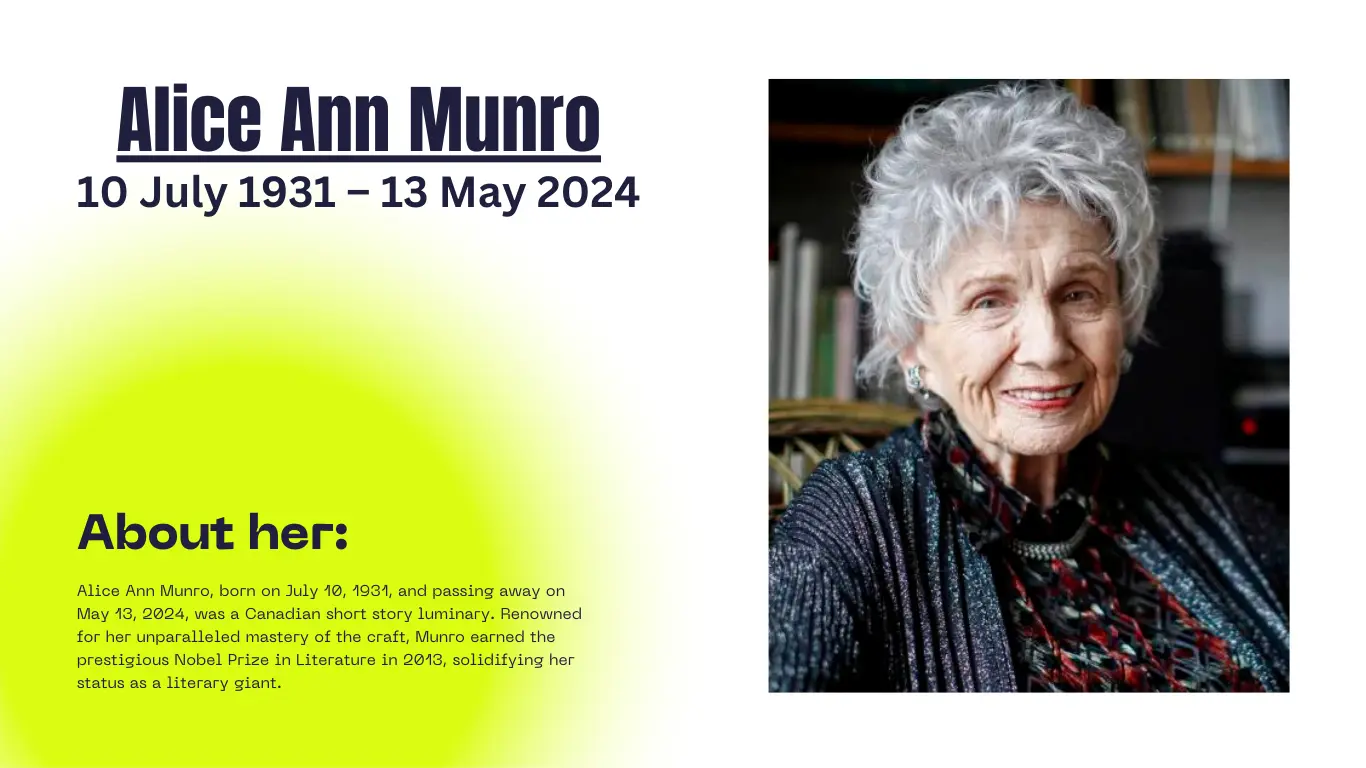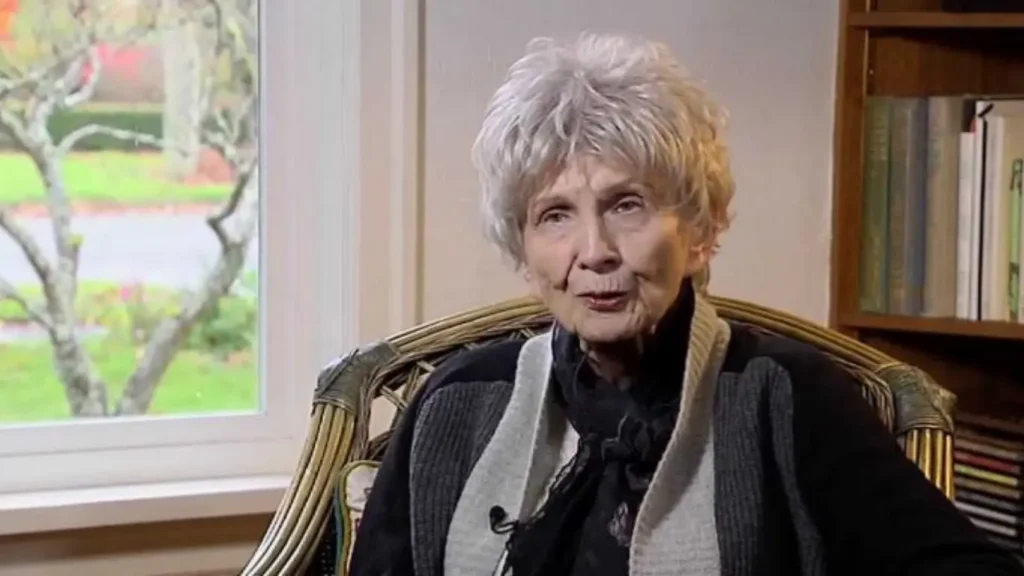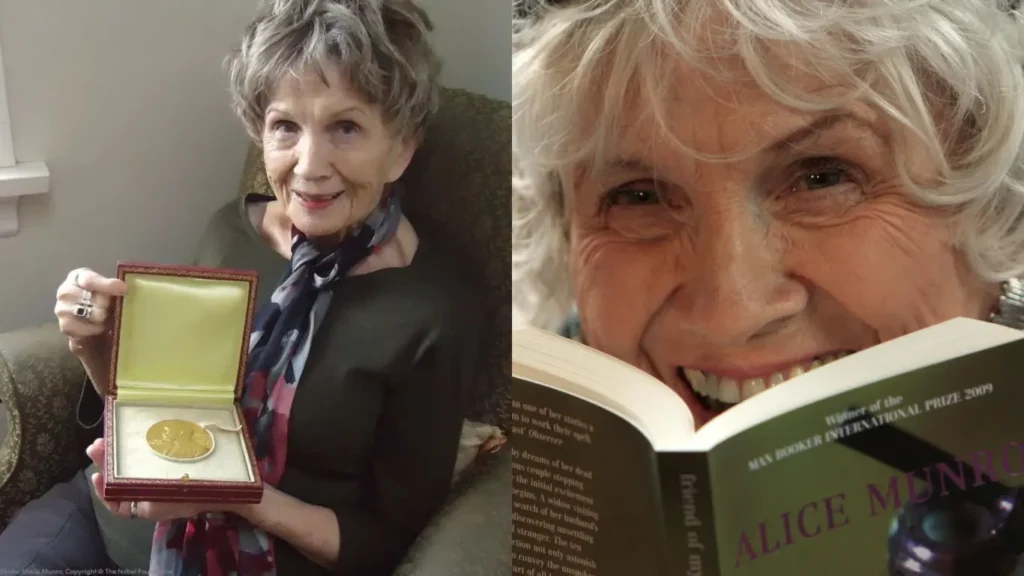Celebrity
Alice Munro, Literature Nobel Prize Winner, Died at Age of 92

Alice Munro, a famous writer from Canada, she passed away at her home in Port Hope, Ontario, on May 13, 2024. She was 92 years old. She had been living with dementia, a disease that affects the brain, for at least 12 years.
Last night there was another American celebrity died at his home town.
Alice Munro a skilled writer known for her carefully crafted short stories that could deeply affect readers. Her characters often lived in rural Ontario, reflecting Munro’s own background. In an interview after winning the Nobel Prize, she explained how living in a small town gave her the freedom to write without feeling pressured to compete with others on a higher cultural level.
Munro felt brave in her creative pursuits because she didn’t have to compare herself to many others in her town who wrote stories. In fact, she believed she might have been the only person writing stories in her community for a while.
This sense of uniqueness and freedom contributed to Munro’s ability to produce her distinctive and acclaimed works.
Alice Munro frequently set her stories in her hometown of Huron County in southwestern Ontario. While, her writing delves into the complexities of human life using a simple and straightforward writing style. So, many people consider Munro to be one of the best fiction writers of our time.
Cynthia Ozick even compared her to Chekhov, one of the most famous writers in history. So, this comparison highlights the high regard in which Munro’s work held in the literary world.
Alice Munro’s Career:
Alice Munro’s first collection of stories, “Dance of the Happy Shades,” published in 1968, received high praise and won the Governor General’s Award. Which was Canada’s top literary prize at the time.

Following this success, she released “Lives of Girls and Women” in 1971, a collection of interconnected stories. In 1978, Munro published another collection of interconnected stories titled “Who Do You Think You Are?.” This book not only earned her a second Governor General’s Literary Award but also made it to the shortlist for the Booker Prize for Fiction in 1980, under the title “The Beggar Maid.”
Between 1979 and 1982, Munro embarked on tours to Australia, China, and Scandinavia, where she made public appearances and held readings of her work. In 1980, she served as a writer in residence at both the University of British Columbia and the University of Queensland, enriching the literary communities in these institutions with her presence and expertise.
From the 1980s until 2012, Alice Munro consistently released a new collection of short stories approximately every four years. Her stories often made their debut in prestigious literary journals such as The Atlantic Monthly, Grand Street, Harper’s Magazine, Mademoiselle, The New Yorker, Narrative Magazine, and The Paris Review.
Munro’s captivating collections have been translated into 13 different languages, reaching readers around the world.
In a monumental moment on October 10, 2013, Munro was honored with the Nobel Prize in Literature. While, she was recognized as a “master of the contemporary short story,” solidifying her place among the literary greats. This distinguished achievement made her the first Canadian and the 13th woman to receive the esteemed Nobel Prize in Literature.
Alice Munro had a significant connection with editor and publisher Douglas Gibson throughout her career. In 1986, when Gibson left Macmillan of Canada to establish the Douglas Gibson Books imprint at McClelland and Stewart, Munro demonstrated her loyalty by returning the advance payment Macmillan had given her for “The Progress of Love.” This allowed her to join Gibson at the new company.
Despite this shift, Munro and Gibson maintained their professional relationship. Munro even wrote the introduction to Gibson’s memoirs when they were published in 2011. Additionally, Gibson often represented Munro at public events when her health prevented her from attending personally, showing their enduring partnership.
A significant number of Munro’s works are available for free on the internet, particularly their initial versions. Before 2003, 16 of her stories appeared multiple times in her own collections, with two stories, “Carried Away” and “Hateship, Friendship, Courtship, Loveship, Marriage,” being republished four times.
Several of Munro’s short stories have been adapted into films, including “Martha, Ruth and Edie” (1988), “Edge of Madness” (2002), “Away from Her” (2006), “Hateship, Loveship” (2013), and “Julieta” (2016). So, these adaptations bring her captivating narratives to a wider audience through the medium of film.
Creating new versions:
Alice Munro often released different versions of her stories, sometimes within a short timeframe. For instance, her stories “Save the Reaper” and “Passion” had two different versions published in the same year, 1998 and 2004, respectively.
Similarly, “Home” was republished with variant versions in 1974, 2006, and 2014, while “Wood” saw different versions in 1980 and 2009, spanning about 30 years.
In 2006, Ann Close and Lisa Dickler Awano revealed that Munro avoided rereading the proofs of “Runaway” (2004) because she feared she might rewrite the stories. They noted that Munro even wrote eight versions of her story “Powers,” showcasing her dedication to perfecting her craft and her willingness to continually revise her work to achieve the desired effect.
Awano highlights “Wood” as a prime example of Alice Munro’s tireless dedication to self-editing and revising her stories. While, Munro, described as a “tireless self editor” by Awano, revisited “Wood” nearly 30 years after its initial publication, demonstrating her commitment to perfecting her craft.
In the revised version, Munro made significant changes to characterizations, themes, perspectives, and even the rhythmic flow of the story, including alterations to conjunctions and punctuation marks. Characters evolved over time, with their perspectives suggesting they were middle aged in the 1980 version and older in the 2009 rendition.
Awano notes a heightened lyrical quality in the revised version, attributed partly to Munro’s poetic precision in her revisions. The 2009 edition of “Wood” features eight sections compared to the three in the 1980 version, along with a completely new ending.
Munro’s approach to revising “Wood” is described as akin to “refinishing” the story, infusing it with the ambiguity characteristic of her endings. While, this process exemplifies Munro’s tendency to reimagine her stories throughout her career, showcasing her continuous evolution as a writer.

Several of Alice Munro’s stories underwent significant changes when republished, with variations in the content allocation to different sections. This can be observed in multiple stories such as “Home,” “The Progress of Love,” “What Do You Want to Know For?,” “The Children Stay,” “Save the Reaper,” “The Bear Came Over the Mountain,” “Passion,” “The View From Castle Rock,” “Wenlock Edge,” and “Deep-Holes.”
In these instances, Munro demonstrated her flexibility and willingness to experiment with the structure and arrangement of her narratives. While, redistributing content among different sections, she crafted new perspectives and enhanced the storytelling experience for readers. This practice showcases Munro’s dedication to refining her stories and highlights her dynamic approach to narrative composition.
Alice Munro’s Awards and Honors:
Aside from the Nobel Prize, Alice Munro received numerous awards and honors throughout her illustrious career in recognition of her exceptional literary contributions.
Awards:
- Governor General’s Literary Award for English language fiction:
- 1968, 1978, 1986
- Canadian Booksellers Award:
- Awarded for “Lives of Girls and Women” in 1971
- Inaugural prize recipient in 1977
- Shortlisted for the Booker Prize for Fiction (UK):
- Nominated in 1980 for “The Beggar Maid”
- The Writers’ Trust of Canada’s Marian Engel Award:
- Received in 1986 for her body of work
- Trillium Book Award:
- Won for “Friend of My Youth” (1991), “The Love of a Good Woman” (1999), and “Dear Life” (2013)
- WH Smith Literary Award (UK):
- Awarded in 1995 for “Open Secrets”
- Lannan Literary Award for Fiction:
- Received in 1995
- PEN/Malamud Award for Excellence in Short Fiction:
- Awarded in 1997
- National Book Critics Circle Award (US):
- Won in 1998 for “The Love of a Good Woman”
- Giller Prize:
- Won in 1998 and 2004
- Rea Award for the Short Story:
- Given in 2001
- Rogers Writers’ Trust Fiction Prize:
- Awarded in 2004 for “Runaway”
- Libris Award:
- Received in 1999 for Author of the Year and Fiction Book of the Year for “The Love of a Good Woman”
- Edward MacDowell Medal:
- Received in 2006 for outstanding contribution to the arts by the MacDowell Colony
- O. Henry Award:
- Received in 2006, 2008, and 2012 for various short stories
- Man Booker International Prize (UK):
- Awarded in 2009
- Commonwealth Writers Prize:
- Shortlisted in various years: 1991, 2002, 2005, 2007
- Nobel Prize in Literature:
- Received in 2013 for her mastery of the contemporary short story
Honors:
Here’s the list Honors:
- 1992: Foreign Honorary Member of the American Academy of Arts and Letters
- 1993: Received the Royal Society of Canada’s Lorne Pierce Medal
- 2005: Awarded the Medal of Honor for Literature by the U.S. National Arts Club
- 2010: Knight of the Order of Arts and Letters by the Government of France
- 2014: Honored with a silver coin by the Royal Canadian Mint for winning the Nobel Prize
- 2015: Canada Post issued a postage stamp in honor of her Nobel Prize win
Cancer Patient:
In 2009, Alice Munro disclosed that she had undergone treatment for cancer and also needed surgery for a heart condition. Specifically, she required coronary artery bypass surgery. This revelation shed light on the challenges she faced and the personal battles she courageously fought while continuing to pursue her literary endeavors.
Despite these health struggles, Munro’s resilience and determination remained evident, reflecting her unwavering commitment to her craft and her steadfast resolve to overcome adversity.
-

 Soccer6 months ago
Soccer6 months agoDutch Fans in Blackface to Imitate Ruud Gullit, One Agrees to Stop
-

 Soccer6 months ago
Soccer6 months agoEx Glamour Model Says Party with England Team Before Euros
-

 News8 months ago
News8 months agoDubai Flood, Rain Turns Desert to Aquarium🌧️🐠
-

 Soccer6 months ago
Soccer6 months agoArgentina vs Peru 2-0 Highlights & All Goals Copa America 2024
-

 Entertainment7 months ago
Entertainment7 months agoThe Try Guys’ Journey From Four to Two
-

 NBA6 months ago
NBA6 months agoCelebrate with the Boston Celtics: Parade and Traffic Updates
-

 Soccer6 months ago
Soccer6 months agoUEFA EURO 2024: Essential Guide and Key Information
-

 Soccer6 months ago
Soccer6 months agoVinicius Jr Scores Two Goals in Brazil’s Win Vs Paraguay in Copa America 2024














Pingback: Slovakia's Prime Minister Fico Fighting for Life After Multiple Gunshot Wounds - Sports Groovy